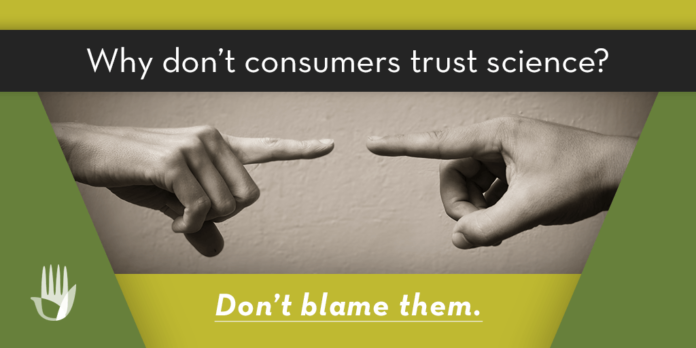
Those within the food system wring their hands about the decreasing influence of science, often blaming consumers for our “post-truth” society. But, there is another reason for the decline of trust in science, according to The Center for Food Integrity (CFI) – one less comfortable to talk about, especially for those who conduct and sponsor research.
“When both sides of a black and white issue claim to have ‘scientific proof’ they are correct, it adds another chink in the armor of science,” said CFI’s Terri Moore. “When investigations reveal rogue researchers willing to produce biased results for a price, it fuels the public’s worst fears about the food system putting profit ahead of public interest. When headlines turn potential coincidences into cause and effect relationships, we should expect nothing else than the loss of public trust.”
But wait, there’s more!
Take coffee, for example. A popular health website touts science-based benefits that will “convince you to drink more coffee” revealing its “high levels of antioxidants and beneficial nutrients” that “may lower your risk of Type 2 diabetes, Parkinson’s and certain cancers, while protecting you from Alzheimer’s and dementia.”
“You know what’s coming next,” said Moore. “The same website warns that some people should definitely avoid coffee because it can cause slowed fetal growth, heartburn, insomnia and drowsiness, and ‘some people are concerned that drinking coffee may increase their risk of cancer over time.'”
So, apparently coffee both protects you from cancer and increases your risk of cancer, according to some unnamed source, she said.
If the ping pong of benefits and drawbacks isn’t enough, the site acknowledges, “It’s important to keep in mind that many of the studies referenced in this article are observational. They examined the association between coffee drinking and disease outcomes but do not prove a cause and effect.”
In other words, the outcomes might be related to coffee or might have absolutely nothing to do with coffee, said Moore. Bottom line: readers may legitimately feel they have wasted 10 minutes of their lives reading the article.
Stop blaming and start acting
The loss of scientific integrity is real. It may be easier to blame “uneducated” consumers, but a good look in the mirror is a healthy exercise for all of us from time to time, said Moore.
Many researchers are under pressure to attract funding and fame, while many journalists are under pressure to collect clicks by sounding alarms about “science-based” findings that have little resemblance to legitimate science.
Instead of pointing fingers at consumers and lamenting public mistrust of science, some groups are taking action to restore scientific integrity.
One group from academia, business and government joined together to develop recommendations to increase transparency in research findings by publishing underlying data and posting detailed methodology, among other things.
Other recommendations to improve a culture of scientific integrity include: scientific journals requiring that study submissions include supporting data (rejecting studies that lack such data) and professional societies providing training seminars to boost scientific integrity among researchers by ensuring studies are replicable, credible and transparent.
“There is also a very clear role for those of us without PhDs,” said Moore.
Anytime we come across articles that claim to be based on science, but also include disclaimers that excuse the content from any level of scientific integrity, we should engage.
“A comment online, a letter to the author or a message to the editor: whatever form the communication takes, we should let them know that despite not having PhDs, we’re smarter than that,” she said. “We reject their hypothesis and respectfully request that they cease to call it science.”
As with many challenges, rebuilding scientific integrity is not the work of one profession or one sector or one industry. It is the responsibility of everyone who believes legitimate science provides a crucial foundation for much of our confidence in today’s food system, said Moore.
###
The Center for Food Integrity is a not-for-profit organization that helps today’s food system earn consumer trust. Our members and project partners, who represent the diversity of the food system, are committed to providing accurate information and working together to address important issues in food and agriculture. The Center does not lobby or advocate for individual companies or brands. For more information, visit www.foodintegrity.org.







